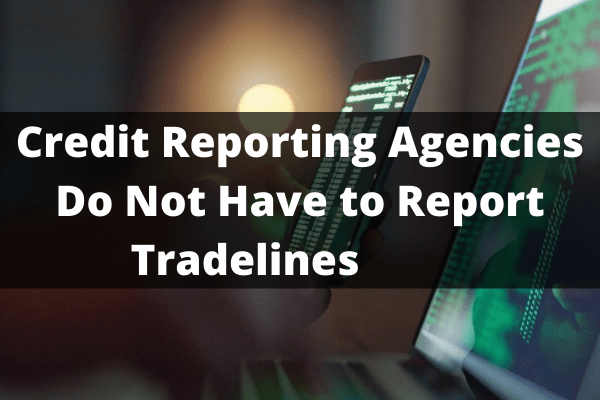Most consumers try to remove tradelines or negative accounts from their credit reports in cases when these might be misleading or incorrect. However, positive tradelines also appear on credit reports such as mortgages or credit cards that are paid on time for several years.
Effects of Positive Tradelines on Credit
Positive tradelines for diligently paid accounts can improve your credit’s strength and many creditors and lenders usually report these positive tradelines to primary credit-reporting firms namely TransUnion, Experian, and Equifax.
Positive credit comes in different types and the main ones are installment credit such as a student loan or a mortgage and revolving credit such as a credit card. They can make your credit stronger if you keep such accounts open then pay them right on time for several years.
But, what will happen if a credit reporting agency doesn’t report the positive tradeline on your credit report? Is it a requirement for agencies to report tradelines?
Do Credit Reporting Agencies Have to Report the Positive Tradelines?
No is the short and simple answer for this question. The FCRA or Fair Credit Reporting Act requires credit reporting firms to adhere to reasonable procedures for assurance of maximum possible accuracy on the credit report of a person but it doesn’t explicitly require the reporting of all tradelines.
A certain court case has notably confirmed that credit reporting firms are not required to report tradelines. The mortgage lender involved in this court case ceased the reports of the mortgage of the consumer to credit-reporting firms. The plaintiff or the consumer filed a lawsuit against the credit reporting agencies to oblige them to report the said mortgage.
Northern District of Minnesota’s federal district court considered if Experian has violated the FCRA when they omitted the positive tradeline in relation to the mortgage of the plaintiff. The argument of the plaintiff was that omitting the mortgage from his report was misleading, which means that the credit report was incorrect. The court didn’t agree with the plaintiff, stating that the credit report was not misleading or incorrect just because the mortgage was omitted. The decision of the court helped confirm that a credit reporting agency doesn’t violate the FCRA if it doesn’t report tradelines on credit reports.
However, remember that the Northern District of Minnesota’s federal district court that decided this case doesn’t have the authority for binding all of the country’s courts. However, this decision offered persuasive authority that can serve as a guide for other courts as they make their decisions on the same topic in the future.
Identifying Potential Credit Report Errors
Although the court that handled the case mentioned above ruled that the FCRA was not violated if the positive tradeline was omitted, most consumers’ credit reports have reports that can have a negative effect on their credit. Even though you can still work to fix these errors on your report yourself, most consumers opt to seek the assistance of an expert who can help them with the issue.



